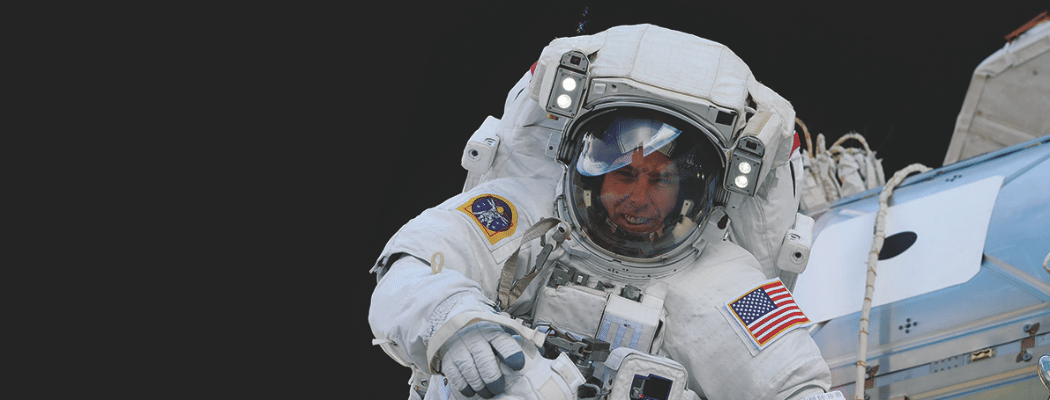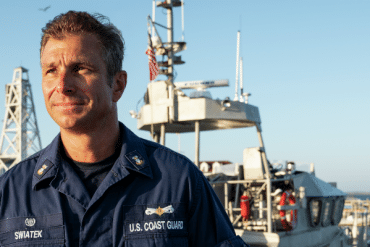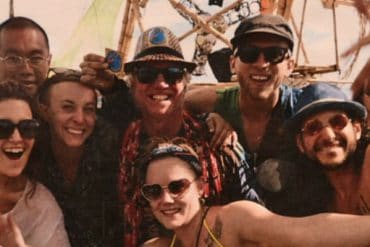An out-of-this-world interview with NASA astronaut Drew Feustel.
Drew Feustel is currently orbiting the earth as a part of a six-month mission aboard the International Space Station. Best known for fixing the Hubble telescope nine years ago, Feustel is chief mechanic on this mission. His work is both incredibly complex and potentially hazardous to his health. Astronauts are bombarded with high levels of radiation over long periods of time, often suffer from vision changes resulting from the effect of weightlessness on the retina, and experience significant risk during takeoff, re-entry and space walks. Despite these perils, Feustel considers his work an enormous opportunity and joins an elite club of those who explore space.
 When he’s not in space, Feustel also loves being on Nantucket. He and his wife Indi were married on the island and have been frequent visitors ever since. They will be returning to the island for some rest and relaxation at some point after Feustel returns to Earth. But until then, Feustel provided N Magazine with its first Earth to space interview.
When he’s not in space, Feustel also loves being on Nantucket. He and his wife Indi were married on the island and have been frequent visitors ever since. They will be returning to the island for some rest and relaxation at some point after Feustel returns to Earth. But until then, Feustel provided N Magazine with its first Earth to space interview.
N MAGAZINE: You took off on March 21, 2018. Can you describe the physical sensation as you took off from the launch pad?
FEUSTEL: We launched from the Cosmodrome in Kazakhstan on a Russian Soyuz rocket. Same launch pad used when Yuri Gagarin, the first human in space, blasted off in 1961. The sensation is incredible and also unnerving. You realize you have left the planet in a hurry and you hope the spacecraft knows the direction to space. There is considerable pressure on your chest and you can feel your face stretching a bit as you try to keep your mouth from hanging open from the g-loads. After several minutes of these launch forces, our breathing becomes labored. The entire process lasts just about nine minutes from blast off to floating in space. By the time we reach orbit we are traveling about 17,500 mph.
 N MAGAZINE: How difficult is the docking process with the space station?
N MAGAZINE: How difficult is the docking process with the space station?
FEUSTEL: Docking is a complex process, and we are trained to perform that task by hand if we experience any system problems. Fortunately, the spacecraft has the capability to dock automatically, as it did for our mission. So our only role is to closely monitor the systems and be ready for any off-nominal situations that may require manual overrides in order to complete the process. We rely on relative navigation (knowledge of position) between the two docking spacecraft (ISS and the capsule) to allow for perfect alignment for rendezvous and docking.
N MAGAZINE: Is the launch or the re-entry the most dangerous part of this mission? Or is there another aspect that presents high risks?
FEUSTEL: Really any aspect of space travel carries risk. I would say that reentry probably carries the greatest risk because we do not really have a second chance when it comes to atmospheric reentry. We only get one shot at targeting our landing site. That is not to say that we don’t have any down mode options. We always try to ensure that a backup system is in place in the event of any failures. Next to launch and reentry, space walks are the highest-risk activity that we do while on orbit.
N MAGAZINE: You are onboard with a group of Russian cosmonauts, do you ever have serious political discussions with them, or is this a source of amusement?
FEUSTEL: In general we keep it pretty light when it comes to politics. We all recognize the political challenges of the world theater, but up here, those things are not important to us. What is important is that we work well together and take care of one another. Each of us relies on the other to save our lives in the event of an emergency every single minute of every day in space.
N MAGAZINE: As you may be aware, the news is pretty wild on earth, do you stay in touch with what is happening here, and do you somehow feel relieved that you are up in space?
FEUSTEL: We do try to stay in touch though our media coverage is typically a few days delayed from what is actually happening. For more serious events we receive emails and can place phone calls to get up to date information. At times, it is nice to be a bit disconnected from some of the tragedies that unfold every day down on our home planet.
N MAGAZINE: I’m sure you have many tasks to perform during the day, but does boredom ever set in or claustrophobia?
FEUSTEL: Claustrophobia no. Boredom not really. There is so much to see on the planet that you never tire of looking at it. It truly is a beautiful sight to see from 250 miles overhead. When we are not taking pictures of the Earth, we can keep ourselves busy with email, phone calls, movies, and music.
 N MAGAZINE: Given how small the space is in which you are living, getting along with everyone else is key, are there ever moments of tension among you?
N MAGAZINE: Given how small the space is in which you are living, getting along with everyone else is key, are there ever moments of tension among you?
FEUSTEL: Sometimes, but those are short lived. We have a great crew right now, and we all enjoy each other’s company. Maybe not all the time, but that is just part of living with other human beings, that’s life.
N MAGAZINE: What is the most awe-inspiring aspect of this voyage?
FEUSTEL: Living in space. My previous trips were short, two-week visits. This is really living, and I find it amazing that humans have developed the capability to live off of our planet so effectively and efficiently. Granted we are reliant on Earth for our survival, this space station is really a marvel of human ingenuity.
N MAGAZINE: What is the most difficult part of this mission either physically or emotionally?
FEUSTEL: Separation from family. Watching them roll underneath at three hundred miles per minute. Recognizing the uniqueness of the opportunity helps to fix your mind on the task at hand but it is challenging to know you are away from so many things for so long. I also really miss just being on Earth. Up here the weather inside the ISS is always the same. No wind, no rain, no sunshine, you miss those things. Physically I think the most challenging part of space exploration is the space walking. Those events are grueling and are always totally exhausting to perform.
N MAGAZINE: Who are some of the most famous people you have spoken to while you are up in space?
FEUSTEL: Well, I’ve spoken to President Obama and also recently to Vice President Pence. Those gentlemen are somewhat famous.
 N MAGAZINE: Last, are you able to see Nantucket out your window, and could you describe to us what it looks like?
N MAGAZINE: Last, are you able to see Nantucket out your window, and could you describe to us what it looks like?
FEUSTEL: We can easily see Nantucket from space. It looks like a great place to visit! A nice little slice of heaven off the eastern coast.
Listen to a voice message from NASA astronaut Drew Feustel sent from SPACE below:







